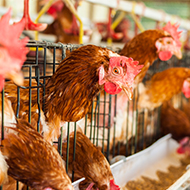Sheep farmers urged to vaccinate early against enzootic abortion
"Once we get close to tupping, there is very little we can do if there is a shortfall in vaccine supply at the crucial time." - Fiona Lovatt
Veterinary surgeons should encourage sheep farmers to vaccinate their flock early in the season to avoid the anticipated shortage of Cevac Chlamydia. The vaccine helps to protect against enzootic abortion of ewes (EAE), which is one of the most common causes of abortion in ewes, and can cost the UK sheep industry up to £20 million each year.
Ceva advises that the EAE vaccine can be administered to ewe lambs from five months of age, and to shearlings (ewes over the age of 12 months) within four months before tupping. The vaccine should be administered at least four weeks before the ram goes in with the ewes.
Ruminant veterinary advisor at Ceva Animal Health Harry Walby said: "We have been advised that there will be stock availability issues later in the year and so we are urging vets to encourage farmers to vaccinate their flocks as early as possible to utilise current provisions of Cevac Chlamydia whilst stocks are available.”
Chlamydophila abortus is a bacterium that causes EAE. It is highly infectious, spreading from sheep to sheep, mainly during lambing time, and can cause ewes to abort or give birth to weak lambs. Sheep that are infected approximately 100 days after pregnancy are unlikely to be affected in that lambing, but the bacterium becomes latent, reactivating in subsequent lambings to cause abortion.
Fiona Lovatt, recognised specialist in sheep health and production, said: “An outbreak of enzootic abortion is devastating - this is a disease for which it is essential to ‘Plan ahead, Prevent disease and Protect the flock’.
“Once we get close to tupping, there is very little we can do if there is a shortfall in vaccine supply at the crucial time. It would be sensible to be ahead of the game and ensure that first time lambers – whether ewe lambs or shearlings - are vaccinated earlier in the season and while there are stocks available.”



 An Avian Influenza Prevention Zone (AIPZ) has been introduced across Wales.
An Avian Influenza Prevention Zone (AIPZ) has been introduced across Wales.